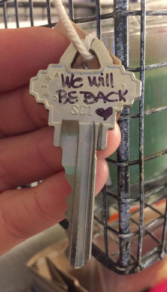Three Tips on Rebuilding After a Wildfire
 Up until a few years ago, the idea that wildfires could
change the shape of a populous landscape over the course of mere
hours was unthinkable. Even after the first series of
catastrophic fires in 2017, it was hard to believe fires could
ever wipe out an entire subdivision, until it happened to me and
my neighbors in Sonoma County’s Coffey Park. And then, equally
unthinkable, it happened to the entire town of Paradise in Butte
County.
Up until a few years ago, the idea that wildfires could
change the shape of a populous landscape over the course of mere
hours was unthinkable. Even after the first series of
catastrophic fires in 2017, it was hard to believe fires could
ever wipe out an entire subdivision, until it happened to me and
my neighbors in Sonoma County’s Coffey Park. And then, equally
unthinkable, it happened to the entire town of Paradise in Butte
County.
There are plenty of things to learn when facing a fire rebuild. I now know the difference between a post tension slab foundation and a grade beam and pier foundation. You will also learn about new building codes and what they mean for your build. It is very easy to get overwhelmed.
I feel for every Paradise resident who is facing the same challenges I did in deciding to start over. Fortunately, or unfortunately as it might be, my neighbors and I now know a thing or two about the process. I am sharing three of the most impactful and beneficial lessons we learned here.
Have Patience.
While it sounds counterintuitive, in fact it might even sound crazy, but please believe me when I say you do not need to rush. I write these words from my “fire rental” anxious to get back home, but I assure you that being patient and pragmatic will help you navigate the delicate balancing act of rebuilding.
The city or county, as well as builders, architects and other stakeholders are all figuring out this process along with you. Fire changed the landscape of your community, and community officials will make changes to policies and ordinances in response.
For example, six months after the fire, the city of Santa Rosa changed the building setback. Some homeowners had already pushed forward with building plans and faced serious repercussions based on this change. After feedback from residents and builders, the city reverted to original building setback, causing frustration and wasting time, effort and money in the process.
Being in a hurry can lead to wasted time and money, but it does not mean you should rest on your laurels. Get involved, attend meetings, gather info and plan ahead. Get your insurance lined up and know your budget. Be sure to have an attorney read any builder contract before you sign it. Don’t get caught up in the excitement to sign only to move forward with a binding contract that can do more harm than good.
Find Strength in Numbers.
This is critical not just for support, but for economy of scale. If you and your neighbors can all band together for surveying and soils reports, you’ll save money. If you can all agree on a builder, more money can be saved and builds can be quicker. When the same builder takes on five houses near each other, it’s easier and cheaper than zig-zagging across the city and sending their subcontractors all over.
There are about a thousand of instances like this. Some homeowners worked together as a group to contact suppliers for group discounts on cabinets and flooring, others negotiated discounts on solar and lumber. Leverage that buying power.
Be Prepared to Make Concessions.
On the flipside of banding together is making concessions. This is the hardest of all. You may see program builders come in to town that put together a menu of plans, finishes and elevations for easy, one-stop-shops. However, we have seen some people select a “menu house” but want one wall moved or a slightly different kitchen. Unfortunately, program builders can’t make those kinds of changes, because they have their process down to a science. Being able to make specific changes means a custom build, which can cost more and take longer.
While the most optimistic of us may view a wildfire as an opportunity to start over and build the home we’ve always wanted, I can almost guarantee that won’t happen. You will have to make concessions of some sort. You have to weigh what is more important– adding an extra bedroom or avoiding a loan, or the difference between a particular cabinet finish and being able to move in two months sooner. These types of decisions, and others, will come up. If you are prepared to make concessions beforehand, and know what is most important to you, then rebuilding can be a little bit easier.
On the verge of 2019 fire season, I wish there was a magic wand to wave and make the rebuilding process fast and painless. Unfortunately, all I can offer are some bits of advice from my own experience and my community. To our friends facing the process in Paradise and to future wildfire survivors, we feel for you and hope you can learn from our experiences.












































